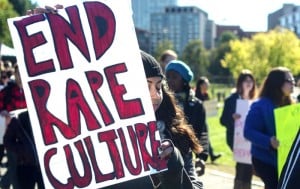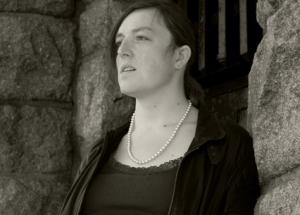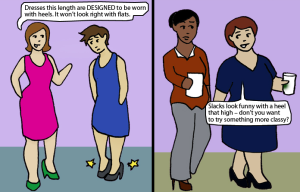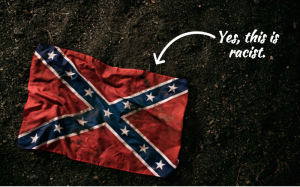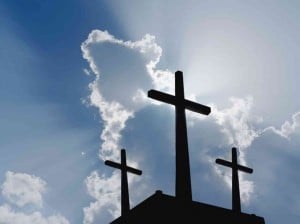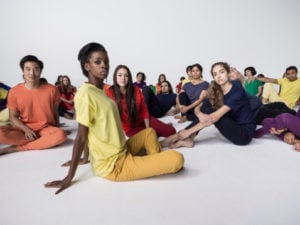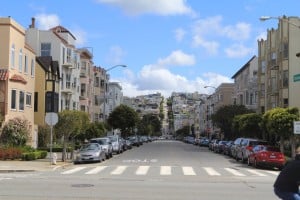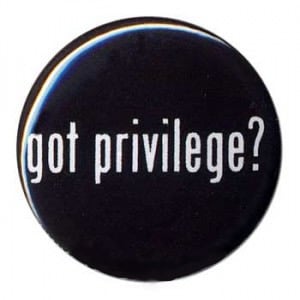
A person looking pensive next to a window, their hand next to their cheek.
In the Philippines, there is a word for people like me: konyo.
It means an English-speaker who has advantageous ties to colonial power or the Western world.
I am a very privileged person of color. Yes, I deal with racist cat calls – Kunichiwa! Ni hao ma! – and a hard pit in my gut when I’m the only person of color in the room. But I’m also fluent in English, I have US citizenship, and I know the white way to socialize.
I grew up in Manila, Philippines, but I visited my mom in San Francisco during school breaks. I developed a Californian accent and a memory bank for Hollywood gossip, and to my embarrassment, my Filipino classmates pointed this out.
I was not quite Filipino, not quite American – I occupied a third space. And as any first-generation American or young immigrant can tell you, this third space is lonely.
But I also see how my Westernization privileges me as an immigrant, how it grants me more substantial opportunities and kinder expectations than a person might offer my grandmother or my peers’ less Westernized parents.
In my activist life, when I’m given a platform, when people look to me to be their Fierce Woman of Color, I tend to speak out against the ways that America denies me access. I don’t often mention that America also rewards my assimilation so that I might begin to forget Other People and twirl unthinkingly in the light of Western privilege.
So how exactly does my privilege show up?
1. When I Speak with Native English Speakers, They Respond at a Reasonable Volume
But they inexplicably end up yelling when they don’t think an Asian person is fluent.
This effectively says, “I believe my preferred language should be the universal one. It seems you wasted part of your life speaking something else, but I am willing to scream my language at you to meet your level of comprehension.”
2. When Traveling in Non-Western Countries, I Receive Better Customer Service
People see my watercolor tattoos and trendy buzz cut as indicators of foreign money. Cab drivers in the Philippines stop for me if I stand right at the curb – after driving past my friends whom they read as locals.
3. Professionals Snap to Attention When I Speak to Them in English
If I find myself in a murky situation with a doctor, store manager, supervisor, or teacher, I know I can communicate my way through it and get to a point where my questions or objections are taken seriously.
Compare this to the patronizing non-answers that my grandmother is expected to accept because her second language is English.
4. A Wider Range of People Are Interested in Dating Me
Because I read J.D. Salinger and listen to Chance the Rapper and watch Orphan Black. Because I style myself like a local hipster, and I look enough like every other girlfriend out on Capitol Hill.
5. People Believe that My White Partner Is Interested in Me Because I’m His Intellectual Peer
Since I don’t fit people’s “fresh off the boat” stereotype, there’s no suspicion that my fella’s with me because he has a “mail-order bride” fetish or wants a Sanrio collectible for the meantime.
Ironically, even as I evade judgment, I judge couples who look like us – cisgender white men and immigrant Asian women. Part of this is based on my own experience of toxic power dynamics, and part of this is internalized racism.
I’ve been socialized to see Westernization as a marker of desirability and agency, so I doubt the sincerity of white men who court less Westernized women, and I wonder – in an awful, complicated way – if the women have the tools and information to be their full selves in the relationship.
6. Because I’m Americanized, No One Wonders If I Need to Marry My Partner for a Green Card
As my partner and I move through the milestones of commitment (ya know, the heteronormative ones), it isn’t a quiet question his folks or sisters exchange: Does she need him to propose?
7. I’m Often Welcomed into Spaces Because I’m the ‘Right’ Kind of Person of Color to Diversify Your Space
Just “exotic” enough to visibly up the diversity index. Just “American” enough that I can appear to “belong” (thin, light-skinned, with an ability to follow white people’s social cues and no discernible Filipino accent).
8. I Was Able to Attend College in the US Because I Easily Accessed Federal Student Aid
I am often called “cool” and “brave” by travel-romantic Americans because I grew up in a non-Western country and moved to the US at eighteen.
But I wasn’t that brave. I had the luxury of knowing I would have four years to build a career-supportive network, and I could afford those four years because the government saw me as a student “entitled” to its aid.
9. On the Job Hunt, I Don’t Need to Tell Interviewers That I Need Help Acquiring a Visa
I don’t worry that this is why I’m not hearing back or feel pressure to far surpass American applicants.
10. When Work Dried Up for Me as a Contractor, I Could Quickly Apply for Food Stamps
If I were a non-citizen, I would need to be classified as a “qualified alien” and be put through a waiting period.
11. I Make the ‘Right’ Jokes, Knowing Which References Entertain White Americans
This took years of American friends explaining memes to me.
12. No One Assumes I’m Homophobic
This is complicated. Because many of my relatives from the Philippines are homophobic.
Before my brother could spell “homophobic,” my mom started routinely announcing that she would kill herself if he turned out gay. And according to my middle and high school teachers, “hell” is a real place where sodomizers live.
When I started to become politicized in America, I thought that “fighting homophobia” meant fighting “conservative” people on the opposite side of the battlefield.
But when I call a non-Western country a “conservative” country as a coded term for “homophobic,” I am essentially waving my American liberal arts diploma around and saying that being Western means being progressive and being non-Western means being regressive.
I disregard an entire country’s humanity because it isn’t America – and only America is allowed to be nuanced.
13. No One Assumes I’m Anti-Black
See number twelve.
My family’s anti-Black. Most young Asian Americans I know would say that their families are anti-Black. So based on common narratives, yes, the previous generations of our community are pretty rife with anti-Blackness.
But I sense a growing mass perception of what an anti-Black Asian looks like (immigrant elder, not fluent in English, non-Western education, insular cultural community) and what a “progressive” Asian looks like (young, fluent in English, American college graduate with liberal arts degree, has white friends, has American friends of color besides Asian Americans).
People see my outward markers of assimilation and credit me as being “progressive,” “informed.” My Westernization once again assigns me value.
14. No One Assumes I’m Sex-Negative
See number thirteen.
Largely unquestioned profile of a sex-negative Asian: a new, unassimilated immigrant, not fluent in English, non-Western education, insular cultural community.
Largely unquestioned profile of a sex-positive Asian: first- or second-generation American, fluent in English, college graduate with liberal arts degree, dates white people and other American people of color besides Asian Americans.
15. I Can Identify as ‘Queer’ – And It Would Be Unconstitutional to Sentence Me to Punishment
And I can marry a person of any gender identity, and obtain a lawful divorce if that partnership becomes unhealthy.
16. In My Particular US City, I Can Easily Obtain an Abortion
The Philippines doesn’t recognize same-sex partnerships and has stalled on a number of gender justice bills. And this lack of legal protection hangs over many citizens, asserting their wrongness.
So yes, my US citizenship is a privilege – it’s undoubtedly still a mess here, but I’d literally never heard a person say “Your body is your own” until I moved to the US.
On the flipside, before anyone points to Philippine laws as evidence of regressive non-Western beliefs, I need to point out that the beliefs of our government come from Roman Catholicism. Which is the oil spill that Western colonization never cleaned up.
17. The World Often Reserves Its Severest State-Sanctioned Violence for Dark-Skinned People
And I am light-skinned because my family intended for me to be so, in accordance with a Westernized values system.
18. I Feel Safer as a Vocal Activist in Seattle Than I Would Expressing the Same Beliefs in Manila
I feel more supported here, too.
This is not because the US is better than my country of origin. The US has a stronger base of educated, dissenting voices because it’s a wealthy country that is able to protect as many of its citizens as it wants to.
And it accumulated this wealth by draining other countries of resources and exploiting people of non-European origins.
Because the American government caused – and continues to cause – violence overseas, countries like the Philippines are still struggling to create systemic stability and build up the same level of civic engagement.
***
Recently, a prospective employer interviewed me and another candidate in the same time slot. The candidate and I had comparable professional backgrounds, seemed about the same age, and expressed similar ambitions.
But the other candidate spoke with a non-North American accent. She paused more often to land on the words she wanted. She was darker-skinned and more conservatively dressed than either the interviewer or me.
I noticed our interviewer begin to angle herself more and more towards me. She would respond to the other candidate’s statements with a nod and follow up my statements with her own earnest self-reflections. She laughed easily when I found moments to lob out American pop culture references and work the verbal tap dance of a Gilmore Girl.
As I sat in the full beam of our interviewer’s smile, I felt the slimy splashback of history. At some point, folks in my lineage made it a priority to pass down lighter skin and smaller noses, English fluency and belief in the American Dream.
Any visibility I get over others is the product of these diligent efforts to assimilate.
All that is Western is valued. All that seems “foreign” and unable to transform is expected to disappear. We’re expected to assimilate ourselves into the ground in order to be just a little bit visible, and we are expected to assimilate more quickly, more thoroughly, than that person or those people.
I can rail against oppression like it is always large, monstrous, and outside of me. Or I can see it clearly in the instances that it is my friend, my guardrail, my seat at the table.
[do_widget id=’text-101′]
Search our 3000+ articles!
Read our articles about:
Our online racial justice training
Used by hundreds of universities, non-profits, and businesses.
Click to learn more





